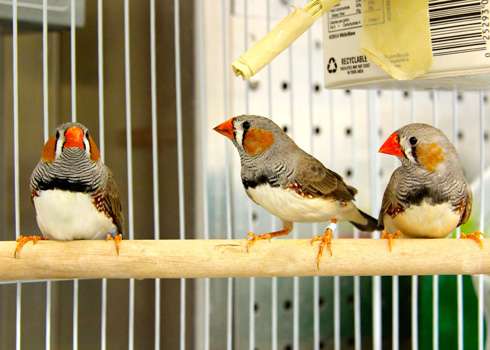Neuroscientist investigates how our social lives affect our brains

Want a healthy brain? Get a little help from your friends.
Research shows that social experiences can directly improve brain function, as long as they don't become overly stressful, which can impair brain function.
This sweet spot of optimum social interaction is the research focus of Virginia Tech neurobiologist Kendra Sewall, an assistant professor of biological sciences in the College of Science and a Fralin Life Science Institute affiliate.
Supported by a recent $100,000 grant from the Jeffress Trust Awards Program in Interdisciplinary Research, Sewall examines the correlation between social interaction and brain function in zebra finches—a highly sociable bird that lives in a range of flock sizes, from pairs and small family groups (2 to 4 birds) to large aggregate flocks (up to 100 birds).
Extensive social behavior, which often accompanies a large flock size, is associated with superior cognitive abilities, larger brains, and enhanced neuronal architecture.
However, if the social behavior becomes chronically stressful, perhaps due to overcrowding or competition, a stress hormone called glucocorticoid is produced. In high amounts, this hormone can impair neural plasticity and compromise brain function.
"This research will help us better understand the behaviors of wild birds living in populations at higher density due to habitat degradation and decreased food resources," said Sewall, who is also a faculty member with the new Global Change Center at Virginia Tech. "But it will also inform thinking about both beneficial and negative impacts of social experiences on human mental health in an age of increased brain-related disorders such as anxiety, depression, and autism. Human responses to social contact and stress mirror those of social animals such as zebra finches."
Sewall and her team rear zebra finches in captivity and house birds in either large or small flocks to manipulate the amount of enriching social contact. Then, some birds are treated with stress hormones to mimic the negative effects of chronic social stress.
By comparing measures of neuronal survival and synaptic plasticity that are important for learning in birds from different treatment groups, Sewall's team will determine how the costs and benefits of social experiences directly impact brain function.
They will use new radio frequency identification technology to track individuals within groups and generate mathematical models of social dynamics to better understand the basis of individual variation in brain changes.
Provided by Virginia Tech




















